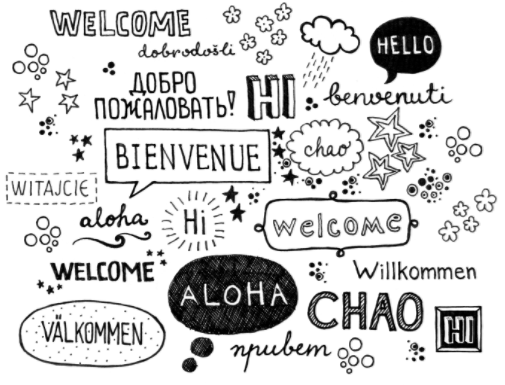Related Issue 1: To what extent should globalization shape identity?
What is My Language?
Your individual identity can be easy to describe or it may be very complex. Who you are can be connected to your community, your language, your values and beliefs—even to how you dress and the activities you prefer. Often people think of their individual identity as a matter of personal choice. When the influences of globalization in the twenty-first century are examined, you may find that global contact and connections can also influence your personal choices about who you are. Understanding the forces of globalization and how they shape who you are, both individually and collectively, is the focus of this section.

Language can connect people with friends and family. When you communicate in a language you share, you can feel included and part of a group. It can define who you are. Think about the language you speak. Do you speak several languages? What does the language you speak say about who you are? Are there words you use that identify where you are from? Your age? Your interests?
You may have words and names you use that are unique to your family and friends. You may also find that much of your language is made up of vocabulary used elsewhere in the world. This may be due to globalization. Language, like many other products and trends, can travel beyond borders in a globalizing world. This can have a uniting impact when people are able to understand and communicate in the same language. It can also alter identities and affect the languages people speak. For many Canadians, language is an expression of their identity. The loss of their unique language can lead to the eventual loss of their unique culture and identity.
Language can be more than just communication between people. It communicates who they are.
What is my language?
How does my language reflect who I am? Throughout this lesson, think if language is used to reflect your identity, both individual and collective. Does it connect you to your community and your world? Will increased global contact change your language and who you are?
collective: related to members of a group that share common characteristics such as language, culture, and identity
community: a group that shares a connection to the same region or the land

Read
Pages 26 to 38 in Perspectives on Globalization.

Reflection
Please complete your Language Reflection
Assignment
Lesson Summary
Does your language say who you are? In this lesson you recognized that for many people, language is their identity. It shares views and understandings of the world. It connects you to your community. It transmits knowledge and culture. Your language is not immune from the impact of globalization. Globalization can allow you to communicate globally with others who share your language, or it can erode the uniqueness and the sustainability of your language. This can change who you are and your culture. For many Aboriginal and Francophone people in Canada, without their unique language, it affects how they live their lives and their quality of life.
Understanding this related issue can help you respond to the module question: To what extent should globalization shape identity?